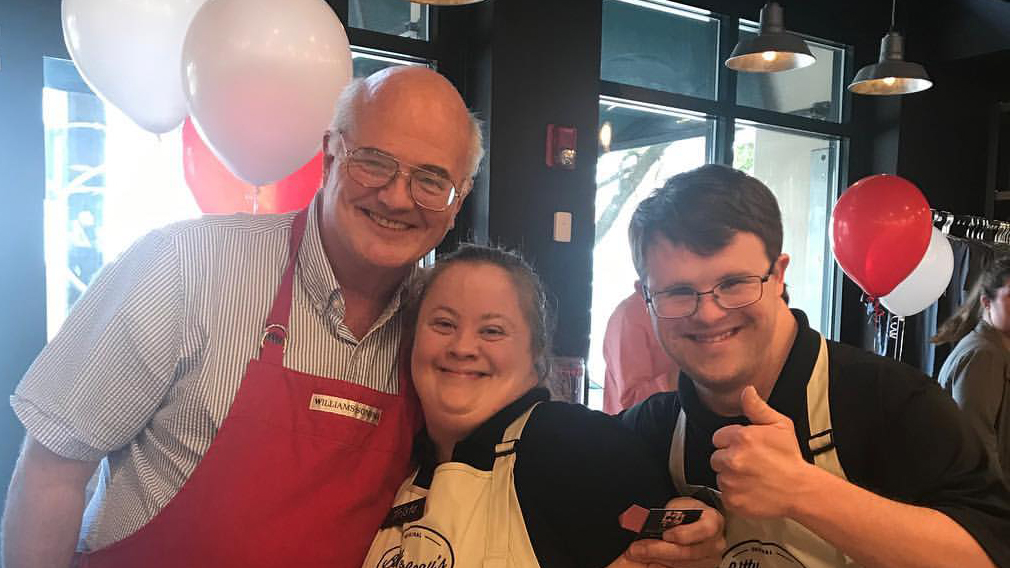Trista Kutcher is a busy woman. At 29 years old, she has already successfully worked six different jobs. At one point she was working three jobs at once, simply because, as she says, “I love to work. I just love it so much” — until her mother encouraged her to reduce her schedule to two.
But what sets her apart from the typical, hardworking American employee? Trista is an employee with Down syndrome, a genetic condition that can pose substantial obstacles for people like her who wish to enter the workforce. According to a 2015 study, 57% of individuals with Down syndrome in the United States reported they were currently working a paid job. However, only 3% of those working reported working a 31–40 hour week, or full time.
We know these individuals want to work, but most workplaces and communities are missing out. In fact, most employers may not know what Down syndrome in the workforce even looks like. It may be helpful to address a couple nagging questions:
- What does employment for a person with Down syndrome look like?
- What unique skills do people with Down syndrome bring to the workplace?
Trista’s story can provide some answers. Since 2017, she has spread her infectious love and joy for life at her current job as a barista at Bitty & Beau’s, a coffee shop in Charleston, South Carolina. Founder Amy Wright named the establishment after her two youngest children, Bitty and Beau, who both have Down syndrome.
The coffee shop is run by employees with intellectual and developmental disabilities (IDD) and strives to create an environment that showcases the value and skills of those living with IDD.
Trista was the first employee to be hired at Bitty & Beau’s second location in Charleston and has been heavily involved in the shop ever since.

Trista showing off a “Don’t Forget to Smile” note she gave to a customer
“I had other jobs before Bitty and Beau’s like working at On the Border, a movie theatre, and two different preschools…I got my job at Bitty and Beau’s…and helped with marketing before they opened the Charleston shop. Now I work in the shop, and I work in a preschool too. I love it. I love to be busy.”
Trista is famous with customers for her much-loved “Don’t Forget to Smile” notes. “I write happy messages on little cards and give one to every customer,” she gushes. Each note is different and written on sparkly paper. This small act of love is just one special “Trista trait” she brings to work with her everyday.
And rather than remaining stagnant in her position, Trista is working hard to move up in her world. She was recently named the Director of Community Relations for her Bitty and Beau’s location and is using the position to brainstorm new ideas for the success of the company.
“I am very proud of being the Director of Community Relations. It is a very important job to tell people to come to our shop and check out our coffee…I have come up with some ideas like a punch card we give to people who work near the shop. They can buy nine coffees and then get the tenth coffee free…I want to ask the hotels near our shop to serve our coffee, so I am going to start working on that too.”
Her ambition does not stop there. When Trista is not putting in hours at her current job, she enjoys a good Crossfit workout at the gym and perfecting her famous hip hop skills at the local dance studio. When asked what brings her joy and fulfillment in life, she says,
“One of my very favorite things is dancing. Dancing is my life, and I love to show off my moves…I also love Crossfit. It makes me healthier, and I love to lift weights and challenge myself. I want to be in a [weightlifting] competition one day.”
Her Instagram feed @tristathebarista (help her reach 45,000 followers by her birthday!) has several videos showcasing Trista’s hip hop choreography and weightlifting accomplishments.
Every day, she strives to inspire joy in her followers by making her Instagram a “happy place.”
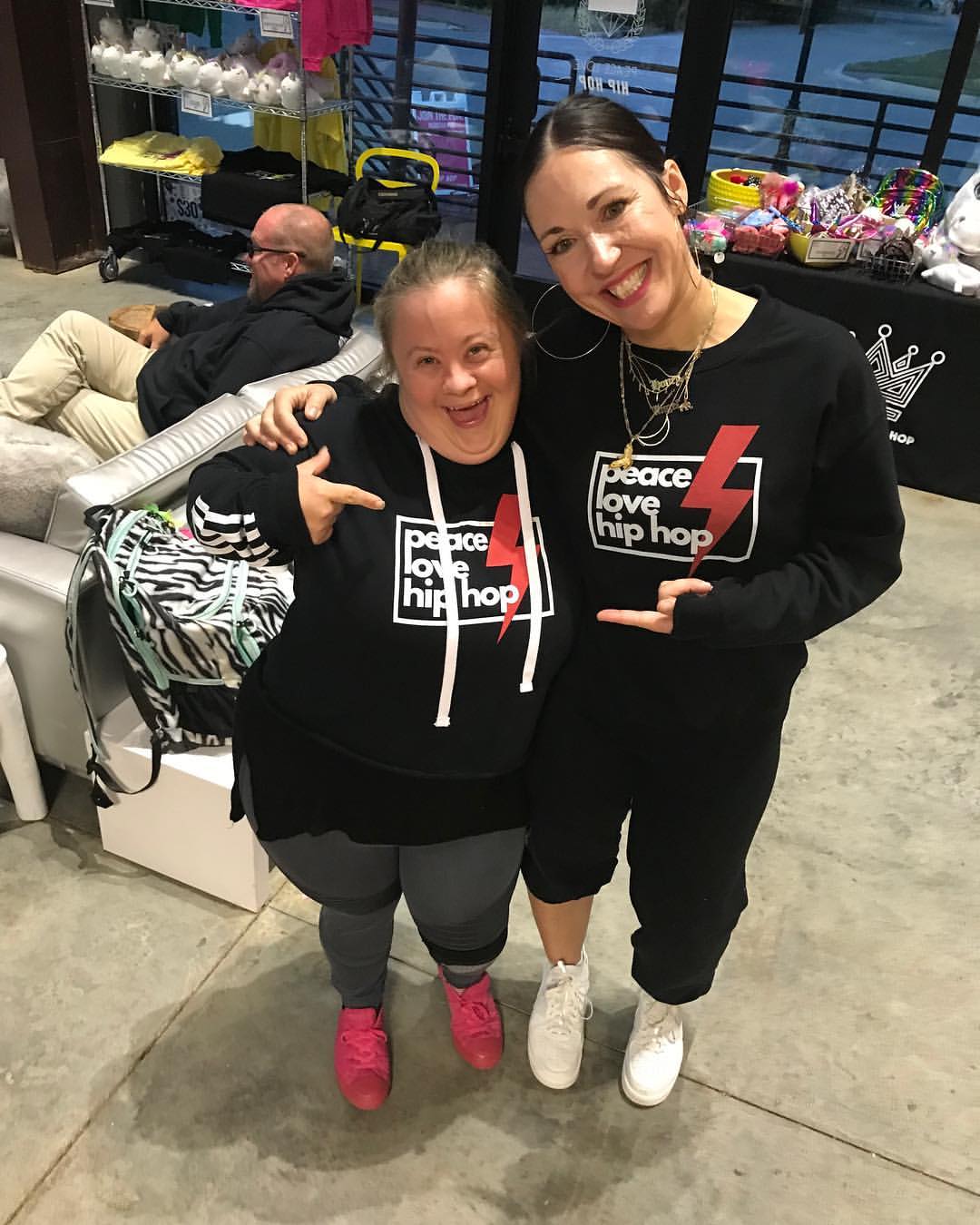
Trista smiling with a friend post hip hop class
“I love my life so much, and I want other people to love their life too…I love to make people happy and smile.”
Trista has big goals and dreams. Like having a career as a businesswoman — something she has already made huge strides in achieving.
“One of my biggest dreams is to meet the Backstreet Boys in person. I love their music, and I would love to be on stage with them and dance with them…I have moves to their music, and I watch their choreography all the time.”
And yet, Trista has also accomplished something else, something much bigger than even her success in her career and hobbies. She has shown thousands of people the value and worth of people with Down syndrome. Her life proves that individuals with Down syndrome can enrich the workplace with a contagious joy and unique perspective on life.
It is the simple things that are often overlooked in our busy culture that Trista cherishes. What she enjoys most about her job, many other workers in her place would be quick to neglect: “Some other things I like are serving my customers with coffee and smiles and checking on them to make them happy.”
While it’s true that Down syndrome poses unique challenges for employment, organizations like Bitty & Beau’s have found employing and training people with Down syndrome is well worth the investment. Not only does Trista’s presence enhance workplace morale and customer experience, it also inspires a more supportive culture where employees help each other. Trista has been aware of her difficulties in learning since her childhood, but she hasn’t let that stop her from achieving great things.
“Something that made it hard during school was [learning] math problems. When I was little, it was hard to speak, but now [I] am good at it. If I don’t understand something now, I ask someone to repeat it or explain it more. They do it, and I get it.”
Like Trista, most individuals with DS are hard workers that are more than willing to put in the effort to learn a new skill, even if it takes more time. And we need to be willing to take the time. The more we learn about Down syndrome in the workplace, especially from the success of companies like Bitty & Beau’s, the better we will understand how individuals like Trista best thrive in their jobs, just like any other employee.
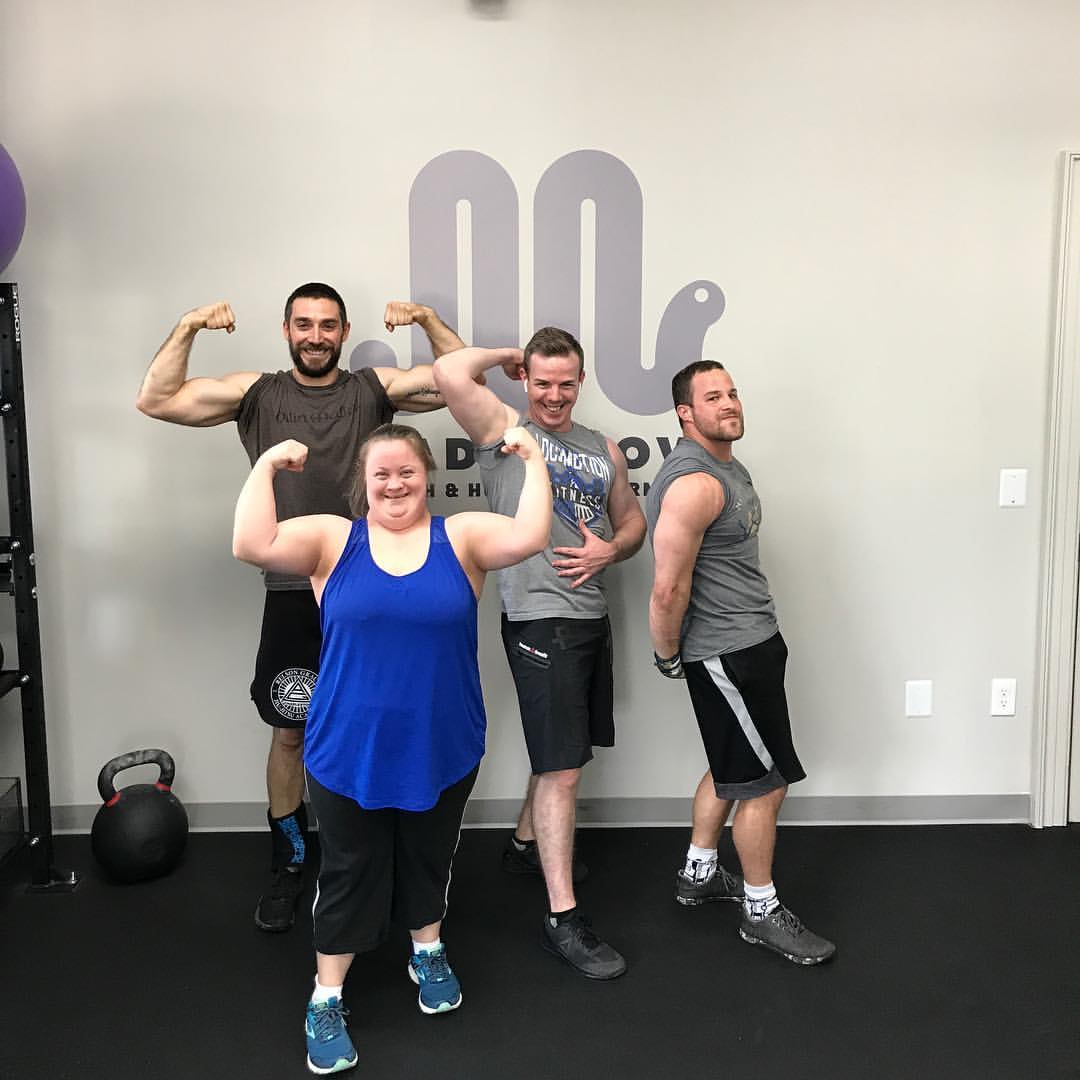
Trista along with her “workout buddies” at the gym
Today, 13% of the US population has a disability. People with disabilities deserve to find fulfillment in their work, and we would be remiss to ignore the enormous untapped potential and diverse perspective they offer to our communities. Down syndrome in the workplace is not scary, it’s just something most people haven’t encountered before. Trista hopes that employers and customers alike will take the opportunity to learn about people who may be different than they are.
“It is important to learn about people who are different than you,” she says, “just like you should learn about people who have a different color skin or speak different languages. Everyone can learn from one another, and we all can learn to be kind to each other.”
“It is important to learn about people who are different than you…Everyone can learn from one another, and we all can learn to be kind to each other.”
Knowledge, and the voices of people like Trista, is the first step to overcoming fear. Employers need not fear the idea of hiring an individual with Down syndrome. This fear, which usually stems from the unknown and unanswered questions (What does this situation look like? What training would this entail?), only limits society and limits compassion.
Instead, fearless workspaces inspire fearless communities. The more we employ people like Trista and listen to their stories, the more loving, kind, and respectful our society will be. It’s safe to say the world would be missing something extraordinary without people with Down syndrome.
“People with Down syndrome are very special to have here on earth because they can change the world for everyone.”
Trista put it perfectly when she said, “People with Down syndrome are very special to have here on earth because they can change the world for everyone.”
Trista Kutcher is a coffee shop barista, hip hop fanatic, and fitness enthusiast who happens to have an extra chromosome. Follow her on Instagram and help her reach 45,000 followers by her birthday in June!
This piece was written as a part of the Extraordinary Human campaign by Voices for the Voiceless. Happy World Down Syndrome Day!
Related Articles
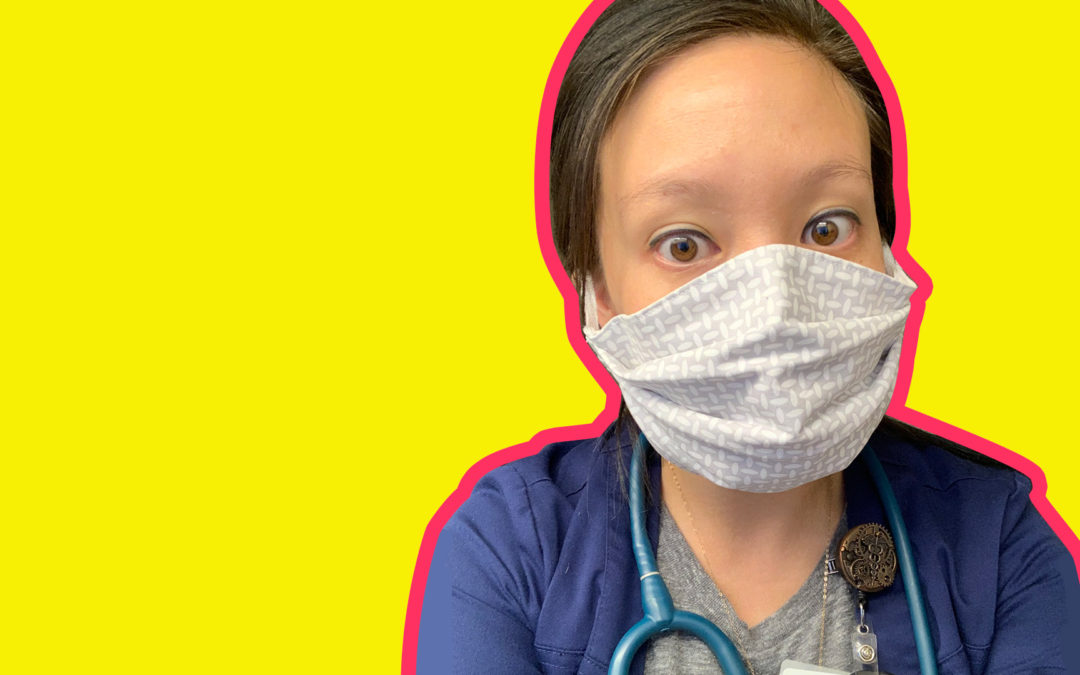
ER Nurse Forced to Leave Her Job Due to Pregnancy Discrimination in the Workplace
What the story of Elizabeth Watts mean for protecting pregnant healthcare workers during the pandemic.
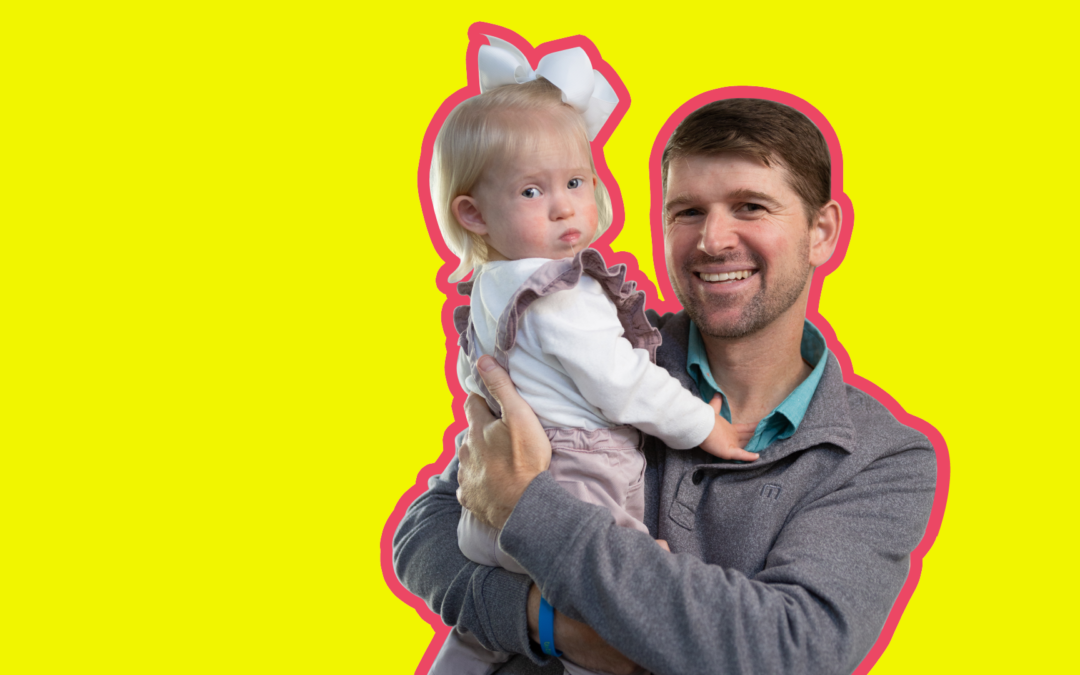
AMA: The Dad Who Hit the Jackpot
Chris Calacci—Dad to Emmy Joy—shares his story and discusses how to transform the cultural perception of Down syndrome.
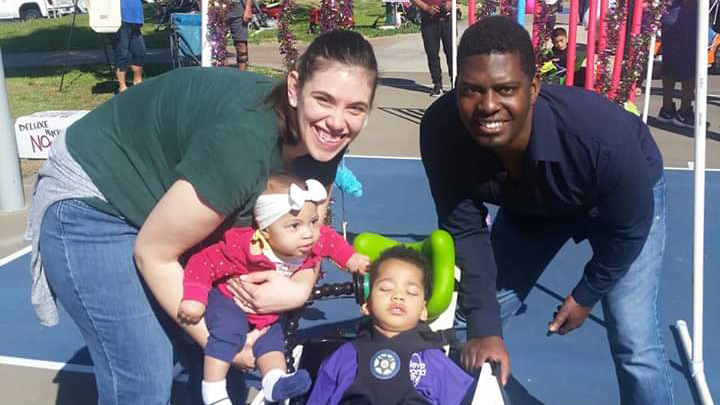
My son can’t do the things you can, but his life is worthy too
Special needs mom Charity Dotson proves every person is worthy, no matter their disability.

